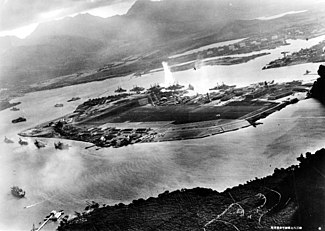Bombing of Pearl Harbor
| Attack on Pearl Harbor | |||||||
|---|---|---|---|---|---|---|---|
| Part of the Asia and the Pacific Theater of World War II | |||||||
 Photograph of Battleship Row taken from a Japanese plane at the beginning of the attack. The explosion in the center is a torpedo strike on USS West Virginia. Two attacking Japanese planes can be seen: one over USS Neosho and one over the Naval Yard. |
|||||||
|
|||||||
| Belligerents | |||||||
|
|
|
||||||
| Commanders and leaders | |||||||
|
|
|
||||||
| Strength | |||||||
| 8 battleships 8 cruisers 30 destroyers 4 submarines 1 USCG Cutter 49 other ships ≈390 aircraft |
Mobile Unit: 6 aircraft carriers 2 battleships 2 heavy cruisers 1 light cruiser 9 destroyers 8 tankers 23 fleet submarines 5 midget submarines 414 aircraft |
||||||
| Casualties and losses | |||||||
| 4 battleships sunk 4 battleships damaged 2 other ships sunk 3 cruisers damaged 3 destroyers damaged 3 other ships damaged 188 aircraft destroyed 159 aircraft damaged 2,403 killed 1,178 wounded |
4 midget submarines sunk 1 midget submarine grounded 29 aircraft destroyed 64 killed 1 sailor captured |
||||||
|
35 wounded 3 aircraft shot down |
|||||||
Coordinates: 21°22′N 157°57′W / 21.367°N 157.950°W
Major Japanese tactical victory; precipitated the entrance of the United States into World War II
The attack on Pearl Harbor was a surprise military strike by the Imperial Japanese Navy Air Service against the United States naval base at Pearl Harbor, Hawaii Territory, on the morning of December 7, 1941. The attack, also known as the Battle of Pearl Harbor, led to the United States' entry into World War II. The Japanese military leadership referred to the attack as the Hawaii Operation and Operation AI, and as Operation Z during its planning.
Japan intended the attack as a preventive action to keep the U.S. Pacific Fleet from interfering with military actions they planned in Southeast Asia against overseas territories of the United Kingdom, the Netherlands, and the United States. Over the next seven hours there were coordinated Japanese attacks on the U.S.-held Philippines, Guam and Wake Island and on the British Empire in Malaya, Singapore, and Hong Kong.
...
Wikipedia
